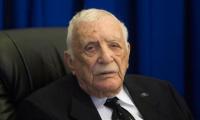Biographical Information

Shabtai Rosenne was a major figure in two fields. As an Israeli diplomat, he helped shape the institutions of government from pre-state days. As arguably the foremost international lawyer of the second half of the 20th century, he made contributions that were vast, influential and unmatched, mixing encyclopedic knowledge of the law with a profound understanding of practice.
His inspiration, springing from his Jewish heritage, was the biblical instruction "justice, justice shalt thou pursue". When accepting the first Hague prize for international law in 2004, he devoted his speech to the place of international law in the daily life of the average human being. He pointed out the extent to which ordinary lives are governed by international agreements, whether covering commerce, transport or the environment. He also focused on the rights of individuals in foreign countries and the rise of war crimes tribunals.
The author of The Law and Practice of the International Court 1920-1996 (four volumes, 1997), Rosenne was the leading authority on the main judicial arm of the United Nations, based in The Hague, in the Netherlands. The role of the international court of justice (ICJ) is to settle legal disputes between states and to give advisory opinions to international bodies, so the political circumstances of the time militated against an Israeli citizen being elected one of its 15 judges. Nonetheless, those who were judges consulted him on difficult questions: he was the accepted authority on the court's working and jurisprudence.
Rosenne was born in London with the surname of Rowson, his family having come from Tsarist Russia, and was educated at Cranleigh school, Surrey. When the second world war came, he served from 1940 to 1946 in the Royal Air Force, something of which he was very proud. He obtained an LLB from London University, qualifying in 1944, began working for the Jewish Agency, the pre-state authority, and moved to mandatory Palestine in 1947.
He served on the committee helping to establish the institutions of the Jewish state, and when it came into being in 1948 he became the legal adviser to the foreign ministry, a post he held until 1967. His contributions were immense, from formulating the armistice agreements of 1949 to dealing with the fallout from the abduction of Adolf Eichmann from Argentina in 1960 to face trial in Israel. There were also state succession issues in the light of sometimes problematic relations with the former mandatory power, and inexorable and sensitive questions of war and peace, use of force and the freedom of the seas. All of this reflected the constant challenges faced by the new country.
Thereafter, he served as an ambassador to the UN – deputy permanent representative in New York (1967-71) and permanent representative in Geneva (1971-74) – and in various international organisations. He was a delegate to innumerable international conferences, notably the sixth (legal) committee of the UN general assembly and in the UN international law commission.
On 14 June 2010, he was appointed to the Turkel commission, the independent public commission established to examine the Gaza flotilla incident. Although not as physically robust as he once was, his intellect was as strong and as sharp as ever. His contribution is likely, once the report is completed, to have been significant.
Rosenne was a truly formidable international lawyer and became an expert in, and great contributor to, for example, the law of treaties (which he termed the central element of all modern international law) and the law of the sea (in which he participated in all the major UN conferences). His list of publications on these subjects and the ICJ was immense. But for Rosenne, law and practice went together. He was always conscious of the importance of practical problems – the reasons why the law was evolving in a particular direction and the need to tackle questions that needed effective resolution. Supremely realistic in providing advice, he acted for and advised a number of states as counsel before the ICJ and other courts and tribunals. These included the US in the Elettronica Sicula case, about the expropriation by Italy of a US-owned Italian subsidiary, and the LaGrand case, about the execution in the US of a criminal who was a German citizen without his being given the required access to a consul; Serbia in the genocide case brought by Bosnia-Herzegovina in 1993; and Japan in the Southern Bluefin Tuna case. He also advised in a number of international arbitrations.
A successful and thoughtful teacher, Rosenne was a visiting professor at numerous institutions around the world, including the Royal Naval College at Greenwich, and the universities of Cambridge, Utrecht, Amsterdam and Virginia. He also gave the general course on international law at the Hague Academy of International Law.
